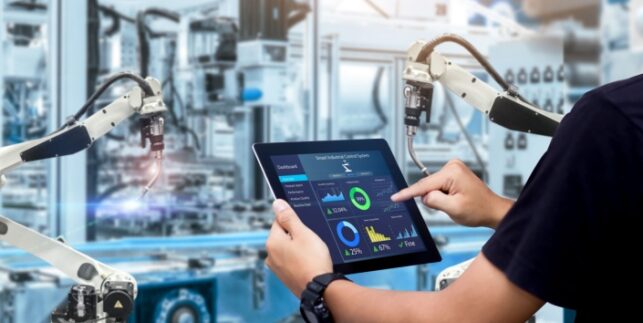Facing the Unique Challenges Posed by Different Types of Manufacturing Processes

Manufacturers implement a variety of different manufacturing processes to produce their goods. These processes vary depending on the specific industries, products, and customers that manufacturers work with. While every shop floor is unique, production processes fall into several distinct categories. Industry 4.0 solutions let manufacturers face the unique challenges posed by these categories.
Repetitive Manufacturing
Repetitive manufacturing includes processes that produce the same parts or components day in and day out without customization or alteration. Manufacturers implementing repetitive manufacturing processes have steady demand for goods with established designs and typically rely on highly specialized equipment.
Automotive part OEMs and electronic component manufacturers are prime examples of repetitive manufacturing. They manufacture the same designs continuously without the need to change over equipment regularly. Instead, the focus is on maintaining consistency and productivity in the output of their production process.
Maintaining overall equipment effectiveness (OEE) is a top priority for these manufacturers. They have a set number of machines and a set number of units they need to produce, and any delay can cause have a significant impact on downstream supply chains. Manufacturers may produce components for a few or even just one customer, which makes meeting their contractual obligations for on-time delivery critical.
Real-time monitoring ensures machine availability and performance consistently meet targets across the shop floor. Production teams can receive instant alerts when metrics dip, letting them act quickly. With the right analytics solution, that same real-time performance data can provide insight that enables predictive maintenance, allowing teams to address issues before they lead to unplanned stops.
Discrete Manufacturing
Discrete manufacturing is used in an extensive range of industries. These processes are often similar to repetitive manufacturing but produce products that vary in design. In addition to the task of maintaining OEE during production runs, manufacturers must now also address the challenges that come with equipment setup and changeovers.
Many manufacturers that produce consumer goods and packaging fall into this category. They rely on core processes, such as molding, cutting, and printing, carried out by dedicated machines. However, the molds, dies, and other components of these machines are changed to provide various products and designs for individual production runs.
Quality becomes a primary concern in discrete manufacturing processes. In repetitive manufacturing, processes run in the same manner all the time. Quality monitoring is still essential, but upsets are rare and typically related to breakdowns or other one-off events. In discrete manufacturing, improper setup presents a risk to product quality during every production run.
This means that manufacturers need a solution to monitor their unique quality metrics. Identifying quality issues early in production runs is vital, as an unidentified issue could lead to the entire run being scrapped after completion. Real-time monitoring with custom metrics and thresholds can let production teams identify quality issues immediately.
Getting the setup right in the first place is just as essential to prevent quality issues. A solution that offers work order management and organizes setup for individual production runs can eliminate human error and improve efficiency.
Job Shop Manufacturing
Job shop manufacturing takes a step away from the largely automated production lines and machinery found in most large-scale manufacturing operations. Instead, this type of manufacturing process is focused more on small batches of goods, often featuring significant customization and being made-to-order.
In this configuration, individual parts and products move between workstations on the shop floor that are handled by skilled laborers. Production teams will frequently deal with work orders that feature different instructions and requirements throughout, which means that simply following a standard procedure isn’t enough.
These types of operations need a solution that keeps jobs on track and ensures that every worker has the details they need. Implementing such a solution through tablets or other devices at each workstation makes it easy for workers to access the specific instructions they need for each work order and lets them immediately update progress and quality information.
Batch Process Manufacturing
Many manufacturing operations are committed to producing output that is better measured in weight or volume than individual units. Chemical industries, food and beverage manufacturing, and other sectors operate differently from assembly lines or job shop manufacturing and have their own challenges to face.
Batch process manufacturing involves processes like these where output is created in individual batches. An individual batch will move through various steps, such as a specific volume of a chemical moving from tank to tank or food products moving from mixing to cooking.
Recipe management is vital for batch process manufacturing. Every batch requires a specific blend of raw materials or ingredients to meet quality requirements. Even slight deviations could result in entire batches being lost. The right solution can monitor actual production against set recipes in real time, ensuring that the right blend is always used.
Continuous Process Manufacturing
Other industries use continuous process manufacturing, where there are no defined batches, and both input and output are constant. Various chemical processes, water treatment, and some parts of food and beverage manufacturing fall into this category.
These continuous processes don’t provide clear boundaries for specific batches or lots to undergo standard quality checks. Instead, quality monitoring must be continuous. This requires a real-time monitoring solution that can identify any quality issues and provide instant notification to production teams. Any unresolved issue will continue to accumulate losses without end in continuous processes.
Recipe management is also just as integral here. Processes require continuous input that must match process requirements. Real-time raw material consumption monitoring ensures that processes always have the correct inputs to maintain quality.
Make the Most of Any Manufacturing Process With Matics
No matter which type of manufacturing process is at work on your shop floor, Matics Real-time Operational Intelligence (RtOI) is the Industry 4.0 solution to maximize productivity and efficiency. You can achieve complete real-time visibility with data aggregation and analysis for all of your machines and systems.
Matics RtOI provides visibility, communications, and work management tools for any shop floor configuration. Your team can access tools at workstations, in the control room, and from anywhere with our reliable and secure cloud solution. Schedule a demo of Matics RtOI today to see how we can help you face your unique shop floor challenges.





